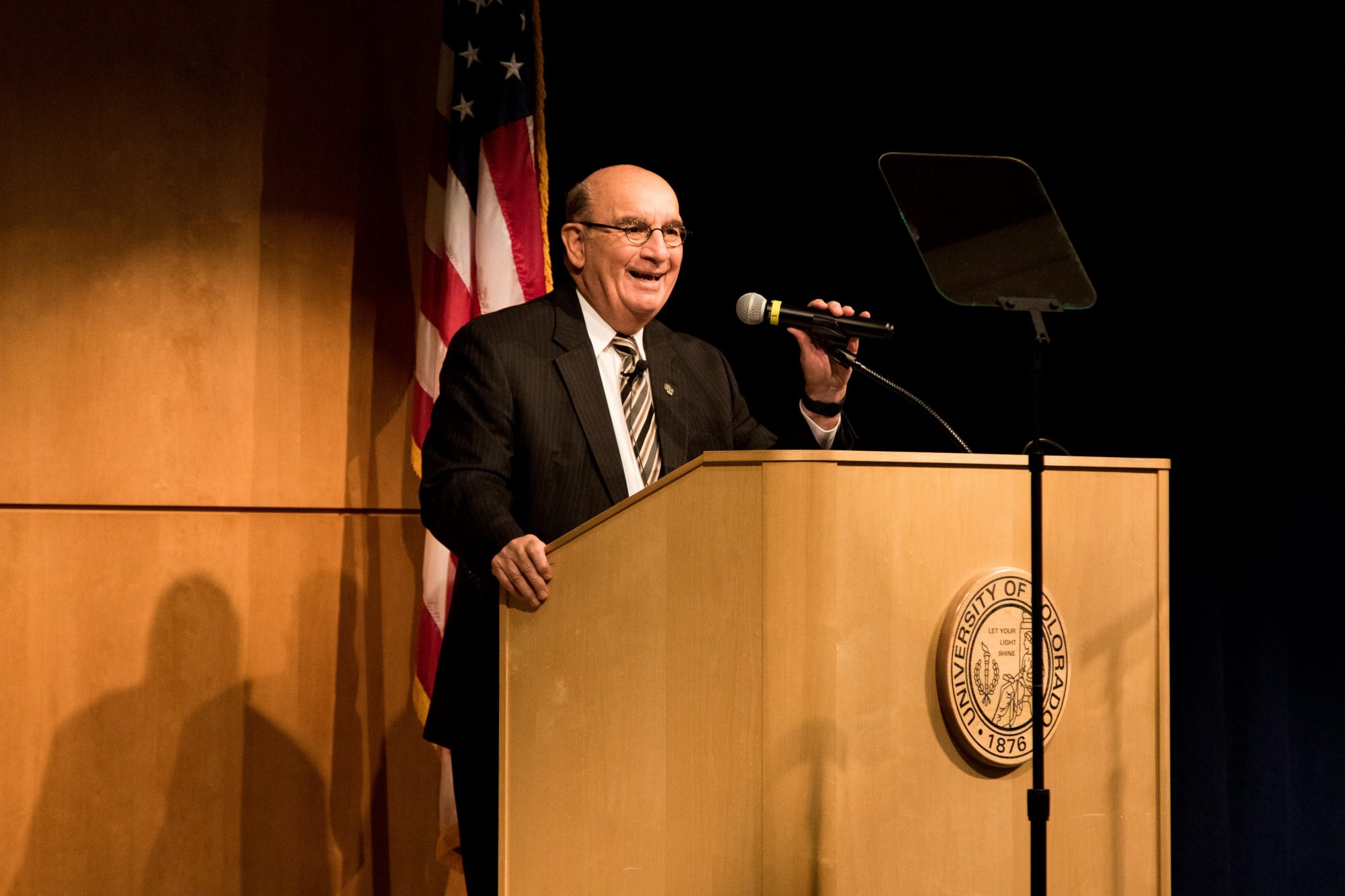
Chancellor Philip DiStefano in the Glen Miller Ballroom giving the State of the Campus address on Oct. 17, 2017. (Jackson Barnett/CU Independent)
Come next fall, students may see a lower tuition bill thanks to a new initiative announced by CU Boulder Chancellor Philip DiStefano at the State of the Campus address.
The new Be Boulder Pact will consist of three parts aimed at lowering costs for students: eliminating course-related fees, continuing new scholarship programs and working with the CU Student Government (CUSG) to reduce the costs of textbooks and course materials.
Course related fees range from $1 per credit hour to over $1,200 a semester. In his speech, DiStefano said eliminating the fees will save students a total of $8.4 million a year, or on average just over $250 per student.
“I believe this will help our students graduate in a timely manner with less debt,” DiStefano said in a statement released after the speech. CU’s class of 2014 graduated with an average debt of over $25,000, according to the Institute for College Access and Success. Mandatory fees, such as the bus fee, rec center fee and student health fee will remain, as well as international student fees.
The Boulder Impact Scholarship, piloted this fall, will also be formalized in an effort to expand financial aid offered to students. The scholarship awards $14,000 over four years to students based on academic success and socioeconomic background. Ninety percent of the 54 scholarships awarded this fall went to first-generation students.
In partnership with the CUSG, the university has offered to invest up to $1 million in piloting an electronic textbook program in an attempt to curb the soaring costs of course materials for students. Nationally, textbook costs have increased over 800 percent since the late 1970s, according to conservative think tank the American Enterprise Institute.
CUSG will present the proposal to the state legislature this November in the hopes that it will be piloted on campus next year and one day implemented statewide, according to CUSG president of internal affairs Troy Fosset. CU administration hopes that the state will match the $1 million they might invest into the program.
Between applauding CU’s accomplishments and the new cost-saving pact, DiStefano affirmed CU’s commitment to free speech on campus, diversity and DACA students.
After praising diversity in his address, DiStefano later revealed in a press conference that CU is behind in their original timeline to improve diversity and inclusion on campus.
CU previously stated that their plan for “inclusive excellence,” commonly know as the Diversity Plan, would be implemented at the beginning of the summer of 2017. DiStefano said that “some [campus groups] are further than others,” referencing the reports administration had asked campus groups to compile in the wake of the 2014 climate survey results. The survey showed that minority students felt less welcome on campus than white students.
CU Spokesperson Deborah Mendez-Wilson later confirmed that the administration has not implemented any plan.
“The campus’s work is ongoing and university leaders remain committed to implementing a plan that addresses multiple challenges,” she said.
DiStefano also affirmed his commitment to allowing controversial speakers on campus. Alluding to both current political turmoil and last year’s protests over conservative provocateur Milo Yiannopoulos’s event on campus, the chancellor voiced his support for free speech.
“We believe everyone should be allowed to express their beliefs, even if we strongly disagree with them,” DiStefano said.
Moving forward, DiStefano introduced a new program called Academic Futures: Rethinking the university — the futures of learning and discovery. The program will include a series of open forums where members of the university can voice the direction they believe the university should take in regards to engaging in scholarship, teaching and service, creatively conducting research and working together as a community.
Contact CU Independent Staff Writer Joel Ives at Joel.Ives@colorado.edu.
Contact CU Independent Multimedia Managing Editor Jackson Barnett at Jackson.Barnett@colorado.edu.
